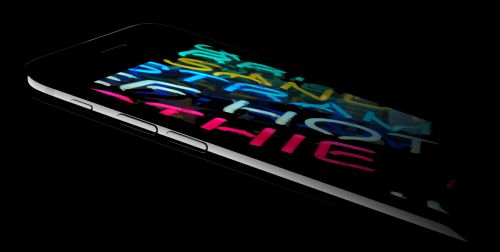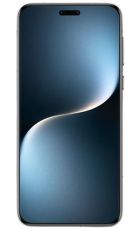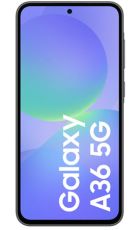Apple has announced its third ever large-screened smartphone, the iPhone 7 Plus. With an innovative new dual-lens camera, it already stands apart from the iPhone 7. But is it enough of a departure from the iPhone 6S Plus before it?
With prices starting from a hefty £719, the iPhone 7 Plus is more expensive than ever. With that in mind, Apple needs to pull out all the stops if it’s to head off the challenge from the Samsung Galaxy Note 7. Read on for our first impressions.
Screen
Apple hasn’t changed the basics with the iPhone 7 Plus’s display. Just like the iPhone 6S Plus and iPhone 6 Plus before it, we’re looking at a 5.5-inch IPS LCD display with a 1920 x 1080 resolution that’s good for 401 pixels per inch.
However, in contrast to those earlier display’s the iPhone 7 provides a 25 percent boost in brightness, and its ‘Wide colour display’ technology produces a wider range of colours than before. While we’re not expecting it to challenge the Samsung Galaxy Note 7’s Super AMOLED QHD display for overall quality or vibrancy, it promises to be the best iPhone display yet.
Design
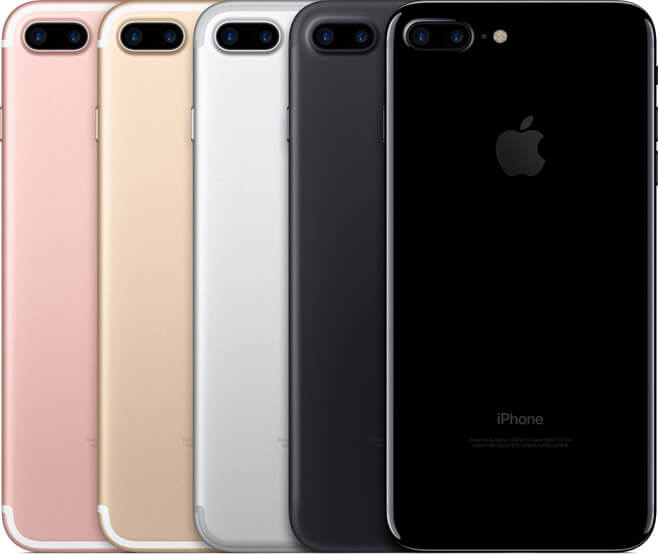
It’s fair to say that Apple isn’t attempting to reinvent the wheel with the iPhone 7 Plus design. To all intents and purposes, this is the same chassis as the iPhone 6S Plus, with a nigh-on identical shape and dimensions - though the newer phone is 4g lighter.
There are several telltale signs that this is a different phone, though. The iPhone 6S Plus’s antenna has been replaced by a more subtle, less obtrusive versions, and the camera (more on which in a moment) blends into the body more than before. Topping off the cosmetic changes, Apple has provided two new tones of black - one a matte finish and the other a shiny variant, the latter of which is only available with the two higher storage capacity options.
Apple has also improved the build of the iPhone 7 Plus. It’s IP67 certified, which means that phone is largely water and dust resistant. Doubtless helping with this extra robustness is a home button that doesn’t move. Instead, a tiny ‘Taptic’ motor simulates the feel of a button press, though we’ll have to go hands-on with final hardware to establish if this is a successful alternative.
Power
It should come as no surprise to learn that the iPhone 7 Plus is more powerful than its predecessor - but the new A10 Fusion chip is more than just a faster version of the A9.
As the name hints at, it fuses together two dual-core set-ups. One is for high-performance tasks like gaming and 4K video, and in this respect it’s 40 percent faster than the A9 chip in the iPhone 6S Plus. The A10’s six-core GPU, meanwhile, is 50 percent faster than its predecessor.
The other two CPU cores are reserved for low intensity tasks. In this way, the A10 is both faster and more energy-efficient than the A9 before it.
We’ll have to wait and see if reports of an increase in RAM for the iPhone 7 Plus to 3GB are accurate (Apple won’t say), but iOS 10 will inevitably run fluidly regardless.
Camera
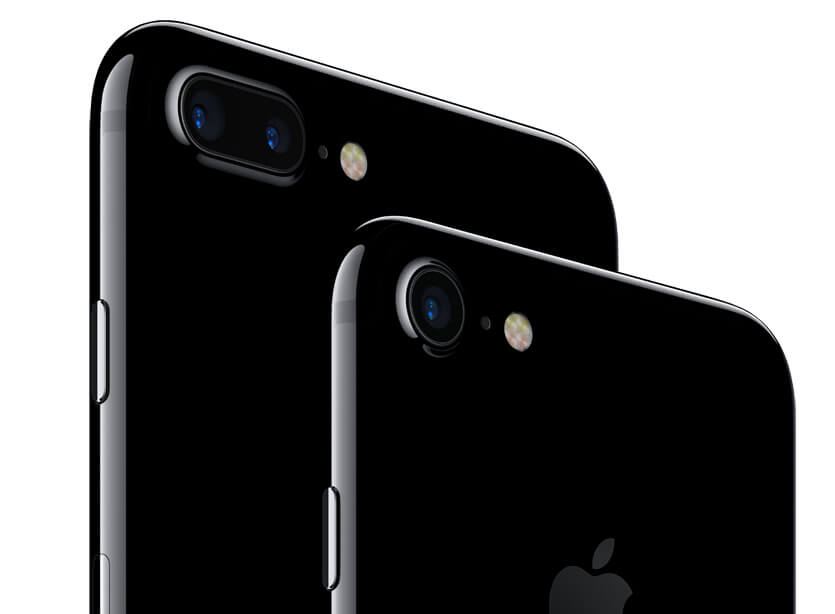
The biggest difference between the iPhone 7 Plus and the iPhone 7, besides the obvious size and display specs, is in the camera department.
Apple has given the larger phone a second 12-megapixel lens, operating right alongside the first. One of these has the same f/1.8 28mm lens as the iPhone 7, which lets in 50 percent more light than the iPhone 6S Plus camera. The second camera, meanwhile, has an f/2.8 56mm lens.
By switching between the two in the camera UI, you’ll be able to attain an optical zoom effect that’s impossible to get with existing digital zoom solutions. In future, Apple will enable you to use these two cameras to accentuate the bokeh effect of your pictures, allowing for stunning portrait shots with artfully blurred backgrounds.
These two cameras are powered by a new image signal processor (ISP) that processes images much faster and better than before. You also get an improved 7-megapixel front-facing camera for even sharper selfies.
Apple has also improved its True Tone flash system. It’s doubled up on LED bulbs for the iPhone’s two-tone flash, which should make for brighter and more natural-looking night-time shots.
Features
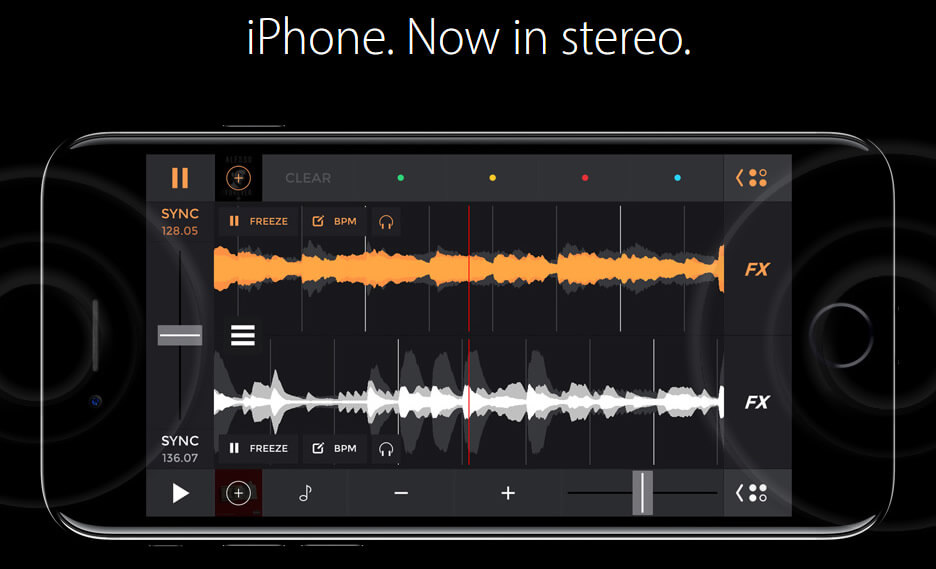
Apple isn’t the first manufacturer to drop the 3.5mm headphone jack from its flagship phone - Motorola did it just a few months ago with the announcement of the Moto Z. Still, it’s a big move from the world’s biggest consumer tech company.
If you want to use headphones with the iPhone 7 Plus, you’ll need to use a new set with a Lightning plug, which hooks into the same port you use to charge the phone. Alternatively, you’ll need to use the bundled-in 3.5mm adapter, or invest in a set of wireless Bluetooth headphones.
Despite the controversy surrounding this omission, the 3.5mm standard is undoubtedly getting a little long in the tooth - it’s been around for more than 50 years - and the switch to an all-digital solution was inevitable. Still, if you’ve recently invested in an expensive set of traditional headphones, the transition might sting a little.
As noted above, Apple has also made the iPhone 7 Plus home button into a solid, non-mechanical touchpad of sorts. Functionally, it is now pressure-sensitive, much like the 3D Touch display introduced in the iPhone 6S and iPhone 6S Plus (and also featured here).
Another meaningful improvement comes with the addition of an extra speaker located within the iPhone 7 Plus earpiece. This allows for true stereo sound for landscape videos and games. These speakers are capable of kicking out sound at twice the volume of the iPhone 6S Plus, with an attendant increase in dynamic range.
Battery life, memory and connectivity
Apple’s keeping quiet about the size of the iPhone 7 Plus battery, as always. But given the strong performance of the iPhone 6S Plus in this department, and the similarity of the iPhone 7 Plus design, we’re expecting it to have excellent stamina.
In fact, Apple claims that the iPhone 7 Plus can last around one hour more on average than its immediate predecessor - doubtless thanks to the A10’s smart quad-core design.
We do know the capacity of the iPhone 7 Plus’s storage, however - and it’s very good news. Apple has scrapped the 16GB base model in favour of a 32GB unit, while the other options are similarly doubled up at 128GB and 256GB.
With those improved cameras, you’ll probably be taking a lot more photos and 4K videos than before, so the extra storage is welcome.
Early verdict
Apple hasn’t come forward with a completely fresh phone in the iPhone 7 Plus, but its list of improvements and new features should make for a worthy upgrade if you’re reaching the end of a 24 month contract.
In particular, the iPhone 7 Plus’s dual-lens feature promises to make for one of the most powerful and flexible mobile cameras ever, while tangible improvements to the phone’s display, processor speed, and battery life should keep it competitive with its rivals.
With iOS 10 looking set to be the biggest upgrade to Apple’s mobile OS in quite some time, we’re expecting Apple to have the most popular phablet of late 2016 and early 2017.
Dimensions (mm): 158.2 x 77.9 x 7.3 mm
Weight (g): 188g
Battery capacity (mAh): Unknown
Colours: Jet Black (128GB and 256GB only), Black, Rose Gold, Silver, Gold
Screen size (inches): 5.5
Resolution: 1080 x 1920
Pixels per inch (PPI): 401
Processor: Quad-core, 64-bit
Processor make: Apple A10 Fusion
RAM: Unknown
Internal storage: 32GB, 128GB or 256GB
Camera: twin 12-megapixel (7-megapixel front-facing)
Operating System: iOS 10


